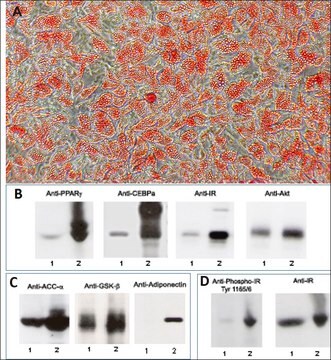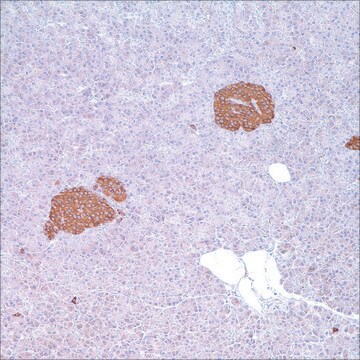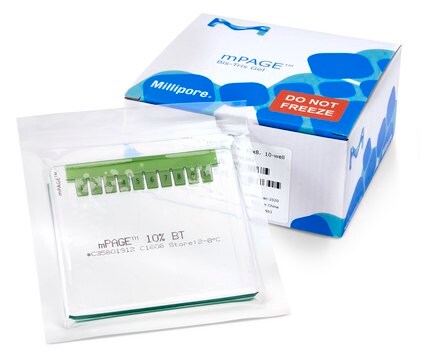SCC250
T37i Mouse Brown Adipocyte Cell Line
T37i mouse brown adipocyte cell line is a versatile model for metabolic and functional studies of brown fat.
Sign Into View Organizational & Contract Pricing
All Photos(1)
About This Item
UNSPSC Code:
41106514
Recommended Products
application(s)
cell analysis
General description
Brown adipose tissue (brown fat) has generated intense research interest due to its unique thermogenic properties and potential applications for development of treatments for metabolic diseases (1). Cellular models that reliably reflect the transition of preadipocytes to brown fat are necessary tools for investigating the mechanisms and roles of brown fat in metabolic systems.
The T37i cell line is a rapidly proliferating brown preadipocyte cell line derived from a mouse hibernoma. Differentiation of T37i cells into brown adipocytes occurs when incubated with triiodothyronine (T3) and insulin over 3-6 days. Differentiation can also be induced by incubation with steroid hormones such as aldosterone, which induces differentiation through its interaction with mineralocorticoid receptor (MR). Mature brown adipocytes are characterized via triglyceride accumulation, morphology, and expression of early adipogenic genes (2). Differentiated T37i cells express the thermogenic uncoupling protein 1 (UCP1) and exhibit lipid droplet accumulation.
<bold>Source:</bold>
The T37i cell line was derived from a hibernoma (malignant brown fat tumor) of a transgenic mouse carrying a hybrid gene composed of the human MR proximal promoter linked to the SV40 large T antigen (1).
Research Category:
Metabolism
The T37i cell line is a rapidly proliferating brown preadipocyte cell line derived from a mouse hibernoma. Differentiation of T37i cells into brown adipocytes occurs when incubated with triiodothyronine (T3) and insulin over 3-6 days. Differentiation can also be induced by incubation with steroid hormones such as aldosterone, which induces differentiation through its interaction with mineralocorticoid receptor (MR). Mature brown adipocytes are characterized via triglyceride accumulation, morphology, and expression of early adipogenic genes (2). Differentiated T37i cells express the thermogenic uncoupling protein 1 (UCP1) and exhibit lipid droplet accumulation.
<bold>Source:</bold>
The T37i cell line was derived from a hibernoma (malignant brown fat tumor) of a transgenic mouse carrying a hybrid gene composed of the human MR proximal promoter linked to the SV40 large T antigen (1).
Research Category:
Metabolism
Cell Line Origin
Mouse, Adipocytes
Packaging
≥1X106 cells/vial
Storage and Stability
Store in liquid nitrogen. The cells can be cultured for at least 10 passages after initial thawing without significantly affecting the cell marker expression and functionality.
Other Notes
This product is sold solely for research use per the terms of the “Restricted Use Agreement” which govern its use as detailed in the product Data Sheet or Certificate of Analysis. For information regarding any other use, please contact licensing@emdmillipore.com.
Disclaimer
This product contains genetically modified organisms (GMO).
Within the EU GMOs are regulated by Directives 2001/18/EC and 2009/41/EC of the European Parliament and of the Council and their national implementation in the member States respectively. Unless otherwise stated in our catalog or other company documentation accompanying the product(s), our products are intended for research use only and are not to be used for any other purpose, which includes but is not limited to, unauthorized commercial uses, in vitro diagnostic uses, ex vivo or in vivo therapeutic uses or any type of consumption or application to humans or animals.
Within the EU GMOs are regulated by Directives 2001/18/EC and 2009/41/EC of the European Parliament and of the Council and their national implementation in the member States respectively. Unless otherwise stated in our catalog or other company documentation accompanying the product(s), our products are intended for research use only and are not to be used for any other purpose, which includes but is not limited to, unauthorized commercial uses, in vitro diagnostic uses, ex vivo or in vivo therapeutic uses or any type of consumption or application to humans or animals.
Storage Class Code
6.2 - Infectious substances
WGK
WGK 1
Flash Point(F)
Not applicable
Flash Point(C)
Not applicable
Certificates of Analysis (COA)
Search for Certificates of Analysis (COA) by entering the products Lot/Batch Number. Lot and Batch Numbers can be found on a product’s label following the words ‘Lot’ or ‘Batch’.
Already Own This Product?
Find documentation for the products that you have recently purchased in the Document Library.
Our team of scientists has experience in all areas of research including Life Science, Material Science, Chemical Synthesis, Chromatography, Analytical and many others.
Contact Technical Service




